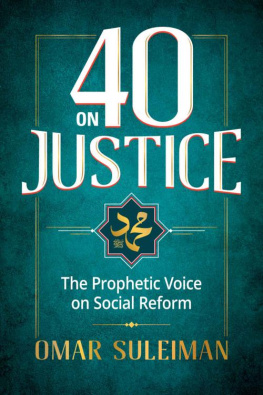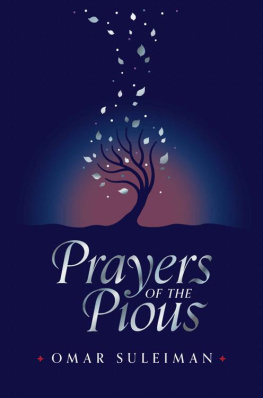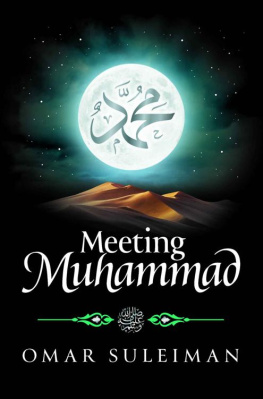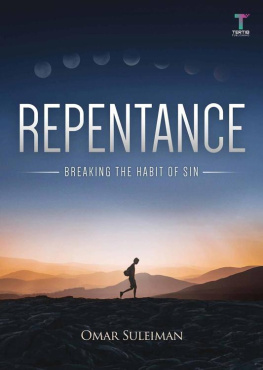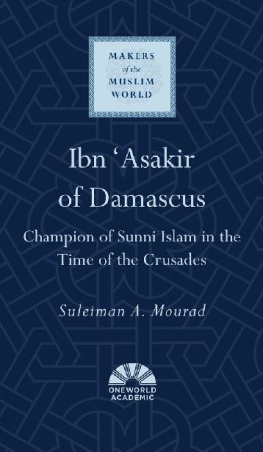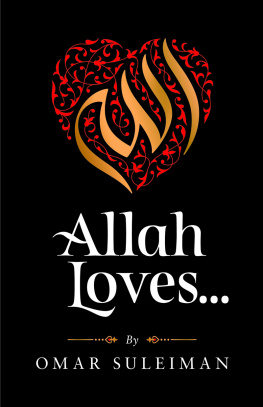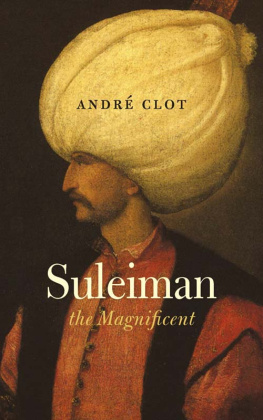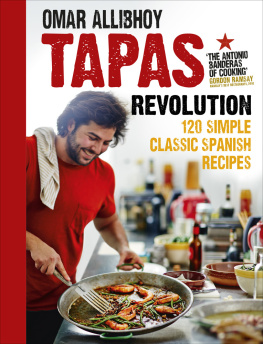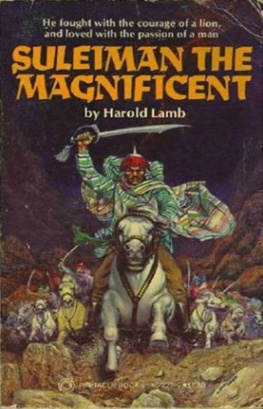Suleiman Omar - 40 on Justice
Here you can read online Suleiman Omar - 40 on Justice full text of the book (entire story) in english for free. Download pdf and epub, get meaning, cover and reviews about this ebook. year: 2021, publisher: Kube Publishing Ltd, genre: Religion. Description of the work, (preface) as well as reviews are available. Best literature library LitArk.com created for fans of good reading and offers a wide selection of genres:
Romance novel
Science fiction
Adventure
Detective
Science
History
Home and family
Prose
Art
Politics
Computer
Non-fiction
Religion
Business
Children
Humor
Choose a favorite category and find really read worthwhile books. Enjoy immersion in the world of imagination, feel the emotions of the characters or learn something new for yourself, make an fascinating discovery.
- Book:40 on Justice
- Author:
- Publisher:Kube Publishing Ltd
- Genre:
- Year:2021
- Rating:5 / 5
- Favourites:Add to favourites
- Your mark:
- 100
- 1
- 2
- 3
- 4
- 5
40 on Justice: summary, description and annotation
We offer to read an annotation, description, summary or preface (depends on what the author of the book "40 on Justice" wrote himself). If you haven't found the necessary information about the book — write in the comments, we will try to find it.
Suleiman Omar: author's other books
Who wrote 40 on Justice? Find out the surname, the name of the author of the book and a list of all author's works by series.
40 on Justice — read online for free the complete book (whole text) full work
Below is the text of the book, divided by pages. System saving the place of the last page read, allows you to conveniently read the book "40 on Justice" online for free, without having to search again every time where you left off. Put a bookmark, and you can go to the page where you finished reading at any time.
Font size:
Interval:
Bookmark:


40 on Justice: The Prophetic Voice on Social Reform
First Published in England by
Kube Publishing Ltd
MCC, Ratby Lane, Markfield
Leicestershire, LE67 9SY,
United Kingdom
Tel: +44 (0) 1530 249230
Email:
Website: www.kubepublishing.com
Copyright Omar Suleiman 2021
All rights reserved.
The right of Omar Suleiman to be identified as the author and translator of this work has been asserted by him in accordance with the Copyright, Design and Patents Act, 1988.
CIP data for this book is available from the British Library.
ISBN: 978-1-84774-144-8 casebound
ISBN: 978-1-84774-143-1 paperback
ISBN: 978-1-84774-145-5 ebook
Editor: Zenab Shahid
Cover Design: Jannah Haque
Typesetting: Nasir Cadir
Printed by: Elma Basim, Turkey
CONTENTS
I SLAM AS A religion is exemplified more than any other virtue by the quality of ramah, a word that is difficult to translate into English. The customary translation of mercy suggests hierarchy, but this is not necessarily the case in the Arabic original. The Oxford Dictionary of English defines mercy as: Compassion or forgiveness shown towards someone whom it is within ones power to punish or harm. Scholars of Arabic have suggested that while this may be an appropriate way to understand how God relates to human beings, it is not suitable for characterising how humans relate to each other. In the latter case, they point out that a more appropriate way of understanding ramah is that it means tenderness (riqqah) towards others. The Turkish scholar, Recep Sentrk, prefers to translate ramah as love, a word that seems to do justice to its meaning and whose semantic range in English renders it appropriate for both human beings and their Creator Who describes His relationship with the believers in the Quran as being of mutual loveHe loves them and they love Him (al-Midah 5: 54).
In a millennium old tradition, the ulama frequently begin their teaching of a new cohort of students with the Hadith of ramah that, as part of this tradition, is the first Hadith a student narrates from his teacher. The Hadith reads in Arabic:

In light of the fact that ramah may be rendered as love, this Hadith can be translated as follows:
The people who exemplify love are loved by the All-Loving One (al-Ramn).
Love those on the earth, may the One in the heavens love you.
Justice as Love
But what does love have to do with justice? Love and mercy are often seen as the opposite of justice. We can either seek justice, or show mercy. But what if the two are in fact inseparable? The African-American philosopher Cornel West, offers us a different way of looking at the relationship between justice and love. In a pithy but powerful phrase, he declares: Justice is what love looks like in public, just like tenderness is what love feels like in private. The message rings true from an Islamic perspective, and our pursuit of justice as Muslims must be spurred by our love for our fellow human beings and our desire for their good. As the Prophet said, None of you truly believes until they love for their brother [and sister] what they love for themselves. We all desire to be treated with justice and fairness, and so we should try to make this a reality for our fellow human beings, whoever they are.
We live in an age in which, perhaps more than any time in the past, we can witness with our own eyes the injustices perpetrated by the powerful against the weak on a global scale. The Quran describes us as a community (ummah) that stands up for justice, even if it is against our own selves and our families (al-Nis 4: 135). While ramah is the defining quality of our religion, the love and mercy it exemplifies cannot truly manifest without a concerted effort on our part to uphold justice. Ultimate justice is not to be had until the next life, but confronting injustice (ulm) in this world is repeatedly enjoined in the Quran. The concept of ulm is frequently coupled in the Quran with the worst of sins in Allahs eyes, namely worshipping anything aside from Allah (shirk). The Quran describes all sins as forgivable except shirk (al-Nis 4: 48). Elsewhere in the Quran, we are told that the Muslim ummah is one that is concerned with commanding right and forbidding wrong (l Imrn 3:104). As the Prophet explains, this is required at every level of our behaviour, even at a psychological level. He informs us: Whoever sees a wrong, let them set it aright with their hands. If they are unable to, then let them set it aright with their tongues (by speaking out against it). If they are unable to do even this, then let them set it aright with their hearts (by recognizing that it is wrong), and that is the lowest level of faith.
The scholars have recognised that each and every Muslim has the responsibility to correct the wrongs of their own behaviour, but also of those around them and their societies. However, this is not to be demonstrated by an unreflective and self-righteous anger or disdain towards those who perpetrate these wrongs. Rather, as the Prophet himself exemplified over the many years of his Prophetic mission, the righting of wrongs, and the rectifying of injustice in the world requires a great deal of patience, wisdom, and indeed love and compassion. As the Prophet once counselled our Mother, ishah, Gentleness is never found in something except that it beautifies it, and it is never removed from something except that it renders it shameful. Yet, when upholding justice required it, the Prophet could demonstrate fortitude in pursuing justice even in just war. The Prophet was the best example of the just human being and his actions are our guide to how we can confront injustice.
An age of injustice
We live in a time that is characterised by extremes of injustice on an epic scale. For the last several decades, we have witnessed major imperial wars and proxy wars by global powers with imperial ambitions. These in turn have given rise to great horrors in parts of the world in the form of rapacious regimes that are willing to kill hundreds of thousands of people in the quest to stay in power alongside an international order whose most powerful states either simply act as observers or actively support such bloodshed. Elsewhere, in the supposed name of fighting terrorism, emerging powers like China have recreated the worst horrors of the last century in the form of concentration camps for potentially millions of Uighur Muslims. Concentration camp like conditions are found in the effective Indian annexation and sealing off of Kashmir, and the decades old settler colonial project represented by the illegal Israeli occupation of Palestine. All of these myriad injustices have given rise to a massive refugee crisis that has witnessed thousands of human beings drown in the Mediterranean and the Bay of Bengal while the civilized world doesnt simply look on, but its leaders often vilify those desperately trying to escape devastation and tragedy. Closer to home, in the West, and for many centuries rather than decades, the twin crimes of racism and colonialism have legitimated the dehumanisation of black and brown bodies in the Transatlantic slave trade and the colonial subjugation of more than eighty per cent of the globe by Western powers.
Next pageFont size:
Interval:
Bookmark:
Similar books «40 on Justice»
Look at similar books to 40 on Justice. We have selected literature similar in name and meaning in the hope of providing readers with more options to find new, interesting, not yet read works.
Discussion, reviews of the book 40 on Justice and just readers' own opinions. Leave your comments, write what you think about the work, its meaning or the main characters. Specify what exactly you liked and what you didn't like, and why you think so.

